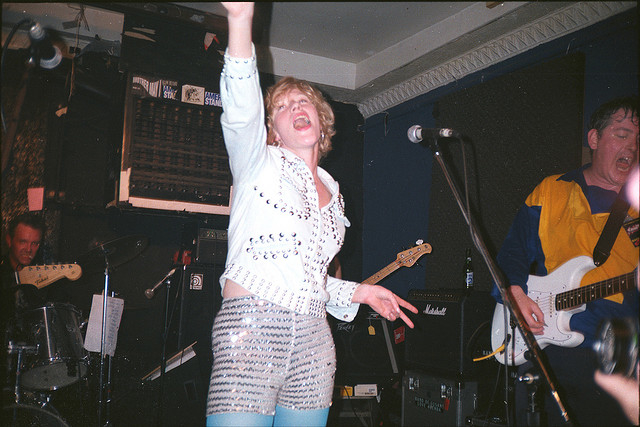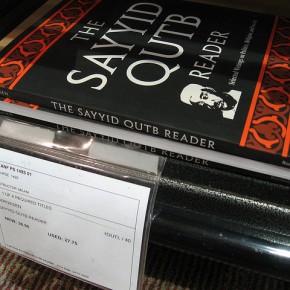The other night I saw Skull Orchard, the latest side band of the Mekons’ Jon Langford, in Brooklyn. I was hungry for some good music, and the show was filling—but not the same way even the best reunions, such as Flag’s recent set, or the Avengers show a few years back, have been.
Although Langford’s work was clearly marked by its period of genesis, the new songs worked for their own sake. It was no rerun. Which posed the question: How have Langford and the other Mekons, who were original ’77 British punks, almost singularly among their cohort been able to be in this position today?
I suppose a full disclosure is in order: I love the Mekons and their offshoots, even though I’m generally not a huge fan of Americana or alternative country. I do like X and the Cramps as an entrée and the Gun Club, Blasters, and Steve Earle as a side dish; and, like most serious rock fans, I have spent time in contemplation of the mysteries of old country, rockabilly, and blues music. Many a collector has gotten lost down these winding paths, never to return, but I have faithfully always come back to my first true love and ultimate comfort food: 1976–1984 punk and hardcore, especially if it hails from New York, California, or Britain.
But as I get older, the limitations of punk rock become clearer. Things that were a burning passion when I was 16 or even 24 can seem rather odd to me now. The relentless nihilism, so marked in the early punk bands, is one of the most problematic elements. Many of my punk friends had the same experience of turning 30: we were bewildered. We had never made plans for what would happen after that, since none of us expected to get there. Maybe punk’s nihilism was necessary to distinguish itself from the earlier hippie generation; but maybe that wasn’t such a good, or even necessary, thing. (Can’t there be darkness, even destruction, without self-annihilation? Mikhail Bakunin, after all, formulated the foundations of anarchism when he was in his fifties.) Over the years, rock archivists and critics have muddied the distinction between the hippie and punk movements by stressing the importance of the Stooges, MC5, Death, the Pink Fairies, Bowie, Eno, Hawkwind, Motorhead, Chrome, Can, Faust, and many others. And while many of these bands were mired in darkness, other than the Stooges, none of them really exuded the pure nihilism that was to come later.
The Ramones have been described as a perfect conceptual art piece: like Duchamp’s urinal, they were a pure idea, simple in execution but rich in implication. (Whether the Ramones saw what they were doing in this way is a different question.) The Sex Pistols also were presented almost as a set piece: one so brilliantly executed that their reverberations are still discussed decades later, only losing their present tense in the last few years. But it’s hard to imagine what a second album would have been like. The Great Rock and Roll Swindle and the Rich Kids show the likely answer: nothing of much interest outside of Johnny. (Although it took me a number of years into record collecting to hear the first PIL album, it shows without a doubt that Rotten nee Lydon—and not McLaren, Jones, or Matlock—was the real rider in the musical saddle; Lydon’s vision was far in advance of anyone directly around him. It still is stunning how he completely turned on his heels and, even before 1978 was over, had written, recorded, and released Public Image.)
John Lydon showed that even if you had started out with a three-chord punk approach, one could still make aesthetic advances,. (The last few years’ revival of interest in these myriad post-punk variations shows the largely belated recognition of their value.) As much as I love early hardcore, it certainly was a narrowing of the open vistas of the 1970s. It’s hard to picture what a punk in 1977 would have thought about the fact that a decade later their intervention would be read as a series of clichéd skulls with mohawks, superimposed on preordained music.

Which brings us back to the class of 1977. Some did continue to make innovations into the 1980s. Lydon leaped from the Sex Pistols to PIL, the Jam’s Paul Weller formed the Style Council, and the Clash grew in different directions. (A number of others lost their way, as Billy Idol and Poly Styrene proved that sometimes it’s wrong to reduce a band to its singer.) But certainly by 1990, almost all of these musicians had thrown in the towel.
That said, it should be recognized that culture never rests, and even today’s clichés can become tomorrow’s deep thoughts. Metal and prog—two of the most embarrassing genres of the 1970s and ‘80s—have become intertwined and have produced some of the most interesting, complex, and intriguing music of the last few years, drawing praise and even participation from all different musical quarters. The ultra-simple, super-maximalist hardcore of the early 1980s bands became the starting base for decades of Sonic Youth’s experiments. And even the simplistic hardcore of the mid-1980s can be seen as setting the stage for grunge, as musicians turned to 1970s rock to embellish and escape the formula.

Overall, rock music is an unforgiving genre, with punk being perhaps the worst of all. Which of us, when faced with a punk band we are sitting down to give a serious listening to for the first time, does not immediately reach for the first album? We would never do the same for a novelist, painter, or jazz musician. For them, early works are expected to be embryonic and protean, mere harbingers; the artist is still honing their skill and craft, probing the subtle mysteries of the eye and the ear.
At best the sound and the fury of punk rock mirrored the Allen Ginsberg’s stated approach: first thought, best thought. But, unfortunately for most, that value system also ultimately produced a notion that the first thought was the last thought worth listening to, everything else being doomed to be a crappy zine photocopied too many times.
I am happy that the Mekons and their side bands escaped the punk rock cul de sac. Jazz, blues, psychedelic, and even metal are genres a musician can grow into and with. Punk never could quite become this, and most of the 1977 punks who did not negate themselves entirely stagnated into endless repetition—or were, at best, capable of a single regeneration into something else.
The Mekons, however, discovered American roots music (most interesting, as the recent Revenge of the Mekons documentary shows, via the stepping stone of English folk music) and were able to graft their punk approach onto this, getting everything completely wrong in a brilliant way, while fundamentally retaining a quintessential and almost intangible punk approach and feel. Adopting pivotal elements of other genres allowed them to change and grow with their music, to make new and evolving albums year after year. And, although I am sure this is a terribly unpunk thing to say, it’s a beautiful thing to watch this unfold, and hear the band’s members continue to make great albums throughout the 1990s, the 2000s, and beyond.
I have always worried that punk nihilism, which comes as such a breath of fresh air at certain times (clearing the “old crap” out; see its recent rise in Russia, Indonesia, and elsewhere) frequently produces a stunted sense of growth. Too often, the initial statement can have no elaboration, no growing level of complexity and depth, no recognition that education and experience might have a positive role to play. To me, Ian MacKaye is the almost singular figure who rose above this conundrum singing, starting with the pinpoint minimalism of the Teen Idles and Minor Threat, but expanding outwards in a way that was able to gain instead of lose potency, even as he moved through genres and complexity. But his exception only proves the rule.
I spent a few years exploring the possibility of Nietzsche as the potential ground for a new anarchist political philosophy, before deciding that Rudolf Rocker and Emma Goldman were right: Nietzsche was an excellent spice, but an indigestible meal, and he needed to remain an inflection on, and not a foundation for, a radical politics of social change. In an even further expansion of this idea, Murray Bookchin argued that anarchism needed to be like beans and rice; it was only a successful political movement when it was combined with another kind of politics, such as syndicalism.
In terms of a long-term diet for musicians, perhaps punk is best consumed in a similar way: it is most optimal when combined with something else. Then the bitter nihilism can add the right flavor to the dish—without overwhelming it entirely.
Photographs courtesy of Mike Evans and Joel Schalit. Published under a Creative Commons license.





